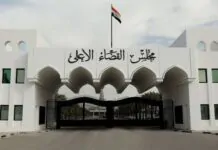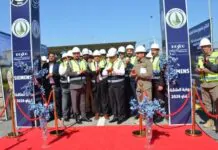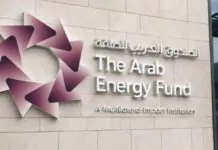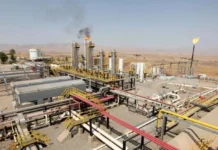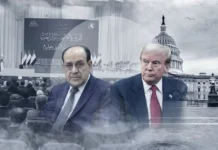Who Will Stop The “Collapse Of The Dinar”? Dollar Prices Continue To Soar In Iraqi Markets
Economy |Baghdad Today – Baghdad The dollar exchange rates continued to rise in local markets today, Thursday (October 10, 2024). Baghdad Today correspondent said that the exchange rates in the main stock exchange in the capital, Baghdad, recorded a selling price of 154,500 dinars for every 100 dollars, while the buying price was 153,250 for every 100 dollars.
He added that the selling price of the dollar in Erbil reached 153,800 dinars, while the purchase price reached 153,600 dinars for every 100 dollars.
He pointed out that the selling price of the dollar in Basra reached 153,500 dinars, while the purchase price reached 153,250 dinars for every 100 dollars.
The exchange rate of the dollar against the Iraqi dinar witnessed a noticeable increase during the past few days, as the selling price exceeded 153 thousand for every 100 dollars. LINK
TBI Moves On Dollar Prices
Economy 2024-10-09 | 10,062 views Sumerian News – Economy The Trade Bank of Iraq (TBI) announced today, Wednesday, that it has taken a series of measures to support the stability of the exchange rate and prevent exploitation by speculators.
The Director of the Tahrir Branch of the Iraqi Bank, Yarab Al-Hashemi, said in a statement received bySumerianNews, “The bank’s management has taken a series of measures to stabilize the exchange rate and prevent market manipulation, including increasing working hours at the bank’s branches, which has had an impact on the speed of completing merchants’ transactions, the smoothness of financial transfers, and eliminating the momentum that has been created in this regard.”
He added, “There is a series of measures being taken successively that will have a clear impact on controlling the exchange rate, preventing speculators, and limiting the granting of dollars to the beneficiaries exclusively.”
Prime Minister Mohammed Shia al-Sudani directed to intensify inspection procedures in financial transfer operations and not to be lenient or lenient in pursuing speculators who exploit the crises the region is going through to achieve personal profits and benefits at the expense of the public interest of the country. LINK
How Prepared Is Iraq For An Expected “Cyber Strike”?
Baghdad Today – Baghdad Cybersecurity expert Ali Al-Zubaidi commented on Wednesday (October 9, 2024) on Iraq’s readiness for any expected “cyber” strike during the next phase.
Al-Zubaidi told Baghdad Today, “Iraq has done its best to provide an electronic firewall against cyber attacks, but what it has is not enough due to the weakness of both the electronic and human infrastructure.”
He added, “These structures are still weak and incomplete and can be easily penetrated. If Iraq is exposed to a cyber attack, its security and military institutions, sovereign ministries, banking information, civil and passport departments, airports, and all institutions that have been subjected to the automation system will be penetrated.”
He warned that “this in itself will create confusion and chaos in the work of these institutions, and the limits of the resulting damage cannot be imagined, as it is determined by the limits of what the attacker can do or achieve, and what he aims to achieve through his attack, but in all cases the damage will be great.”
Cybersecurity is the fifth domain of contemporary warfare, and the loophole through which one can access the positions of all countries and societies, if they are not constantly maintained, in accordance with digital developments.
However, in Iraq, the International Telecommunication Union’s Global Cybersecurity Index still ranks it 107th globally and 13th in the Arab world, despite the availability of many of the country’s main infrastructures, including technologies and skills, among the country’s competent authorities, according to experts.
Successful cybersecurity takes a specific approach that typically consists of multiple layers of protection deployed across the computers, networks, software, or data that one intends to keep safe. In any organization, users, processes, and technology must complement each other and work together to create an effective defense against cyber attacks.
On September 13, the National Security Service announced the launch of the first cybersecurity platform in Iraq.
The agency said in a statement received by “Baghdad Today”, “Security and military operations alone are not sufficient to confront the phenomena that threaten community security, and there must be awareness and education campaigns targeting society in order to fortify itself against these phenomena.” LINK
Experts: Diversifying Revenues Is A Guarantee Of Economic Stability
Economic 2024/10/10 Financial and economic experts expect that the recent developments in the Middle East will create a state of instability in the region and in global markets, including the labor market, which is greatly affected by the general conditions prevailing in a region where oil production is concentrated.
Economic expert and former minister Dr. Raed Fahmy, in an interview with “Sabah”, believes that “countries that depend on oil, such as Iraq, despite the country’s attempts to attract foreign capital, will witness a state of fluctuation,” noting that “this is reflected in the average citizen and his purchasing power, because the turmoil in the region will have a negative impact on the course of things in general, and prices in particular.”
Fahmy pointed out that “Iraq is an importing country, and the volume of its imports constitutes about 90-98% of its needs from abroad, including food needs,” indicating that “import and export operations, and the dollar exchange rates will be affected in the coming days and will be reflected in the commercial movement and exchanges, including the price of oil.”
He added that “the turbulent situation and lack of clarity of vision will affect all investors and projects that may be initiated in the region,” expecting that long-term investment decisions in many countries “will witness a state of waiting that will be reflected in economic activity in general.”
In this context, economic researcher and consulting engineer Imad Al-Muhammadawi told Al-Sabah: “The region is currently witnessing highly tense conditions, which may lead to a rise in oil prices and a change in the dollar exchange rate.”
Al-Muhammadawi considered the country’s reliance on the rentier economy “an obstacle to diversifying the state’s general revenues, as oil revenues constitute about 99% of its exports and 85% of the country’s general budget,” noting that “enhancing non-oil revenues, controlling spending and activating the role of the private sector will work to achieve financial sustainability in such exceptional circumstances.”
It is noteworthy that the government has taken major and important steps to diversify revenues through partnerships with the private sector, reducing tax evasion, rehabilitating factories and paying attention to agriculture. https://alsabaah.iq/103909-.html


